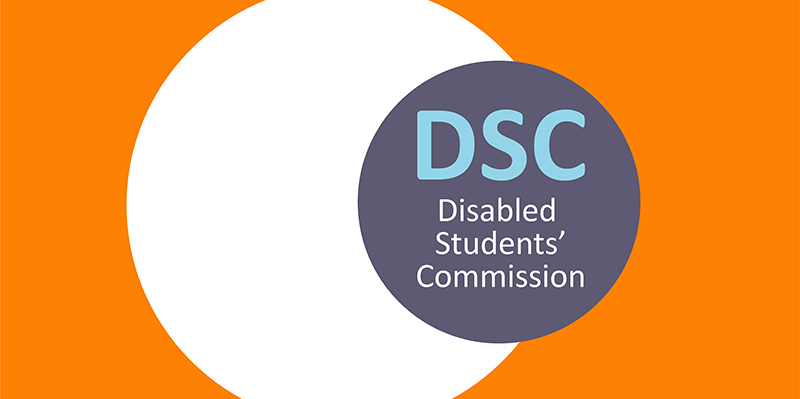Following the launch of a campaign to recruit members for the Disabled Students' Commission, Chris Millward explains the background to the new body, what it will do, and why it is needed.

Disabled students make a significant contribution to a healthy and vibrant higher education sector. They help to build diverse, inclusive academic communities that celebrate difference, encourage innovative learning, and foster an atmosphere of respect and tolerance.
The number of disabled students entering higher education has grown over the last decade. In 2017, 13.2 per cent of all students studying at English universities and colleges reported having a disability. This includes a rise in students disclosing mental health conditions.
Universities and colleges are required to make ‘reasonable adjustments’ for disabled students. Even so, many disabled students face numerous challenges – for example, in relation to funding, accessibility, and learning support. They may also encounter negative attitudes and a lack of acceptance – higher education is not, of course, wholly free of the prejudices that characterise wider society. As a group, they achieve lower degree results overall, and lower rates of employment after graduation than their non-disabled peers.
There is evidence that higher education providers are responding to students’ increased needs with support and services that students rate as good. However, we also know that some student groups are more likely to turn to family and friends and prefer to manage their disability without involving their university or college.
Towards a more inclusive approach to supporting disabled students
There are persistent gaps in the experience and outcomes of disabled and non-disabled students. These are caused by institutions, systems, processes and culture. So there is an imperative for providers to make sure that barriers to success are recognised and dismantled.
There is broad consensus about what steps can be taken to support disabled students, and we are optimistic that these gaps can be narrowed by more widespread adoption of practice that has been shown to work. Improvements can be seen where universities and colleges have shifted to a social (rather than medical) support model.
The social model takes as its starting point the idea that people are disabled by social barriers and prejudice, not by their impairment or difference. Effective support for disabled people involves removing these obstacles to give disabled people more independence, choice and control. The evidence also highlights the importance of senior leadership in creating a culture of inclusivity throughout the organisation.
There is some distance to travel before this and other effective practice is consistently embedded across the higher education sector. The work of the Disabled Students' Commission, a new, independent group dedicated to improving disabled students’ experience of higher education, will aim to change this, and enable more disabled students to benefit fully from the learning, life and opportunities that universities and colleges offer.
What the OfS is doing
The OfS has set ambitious targets to eliminate the inequalities and poor outcomes that disabled students experience. These include a target to close the gap in degree outcomes between disabled and non-disabled students within the next five years.
Higher education providers registered with the OfS are required to take account of these targets when assessing their own performance. They may use them in framing the targets in their new access and participation plans. We’re looking for ambitious and effective action, and we are challenging providers where this is not happening.
We are also working with the sector and with other partners to share insights and experience. What are the barriers and challenges to supporting disabled students? What we can do about them? What approaches work best? As part of this, we are encouraging providers to make more and better use of evaluation, evidence and effective practice.
Alongside this, the OfS is distributing £40 million annually to universities and colleges to help them create more inclusive environments for disabled students.
The Disabled Students’ Commission
The Disabled Students’ Commission (DSC) was announced by the Universities Minister Chris Skidmore in June 2019. It will take forward the work of the Disabled Students Sector Leadership Group (DSSLG). The DSC will provide the challenge that is needed to make change happen by:
- advising, informing and challenging the higher education sector to develop more effective models of support for disabled students in higher education
- identifying and promoting practice and approaches which will help students with disabilities to have a positive and successful experience at university.
The Commission will collaborate with providers, students, sector agencies, regulators and government to deliver this agenda. It will contribute to work on student mental health, and to the work of TASO (Transforming Access and Student Outcomes in Higher Education) to gather intelligence on disabled students’ access to, experience of, and progression from higher education. It will be vital to engage disabled students in these and other initiatives, so that they are involved at every step of the journey towards more inclusive and effective practice.
Recruiting now…
The Commission will meet for the first time in late 2019 or early 2020. It will be chaired by Professor Geoff Layer, vice-chancellor of the University of Wolverhampton. I will be a commissioner, in my capacity as OfS Director for Fair Access and Participation. We are currently recruiting for six other commissioners, including a student voice commissioner to represent the perspectives of current and future disabled students.
We want people with experience of advocating for and making a difference to disabled students in higher education or graduate recruitment, or with leadership experience in disability policy more generally. If this is you, we'd like to hear from you.
Find out more about the Disabled Students' Commission, including how to apply to become a commissioner. Applications close at midnight on Sunday 20 October 2019.

Comments
Report this comment
Are you sure you wish to report this comment?